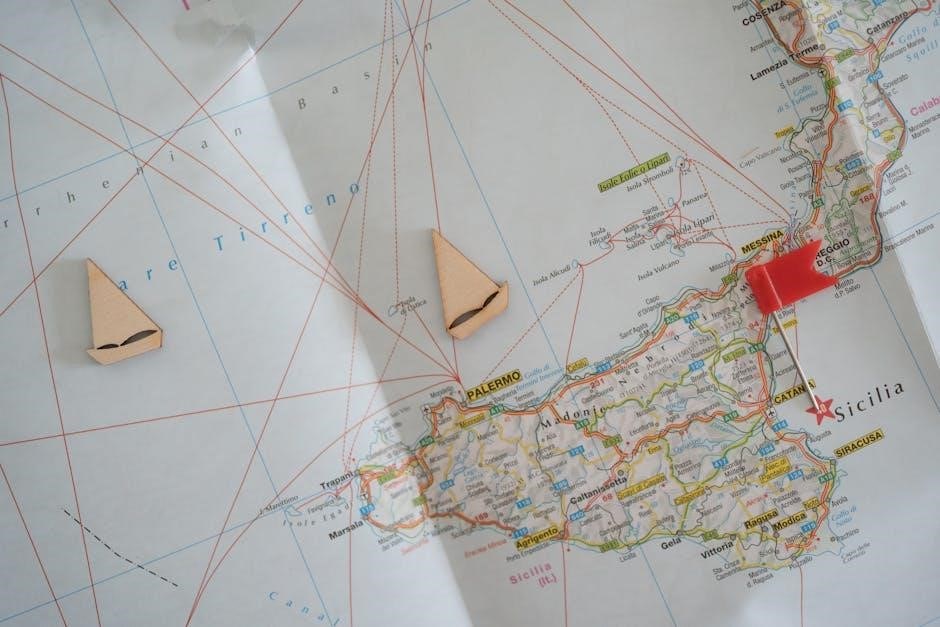This guide provides a comprehensive overview of the AQA GCSE Geography curriculum‚ offering structured revision strategies and essential resources for both physical and human geography topics.
1.1. Understanding the AQA Specification
The AQA GCSE Geography specification outlines the content‚ assessment structure‚ and skills required for the course. It is divided into two main components: Physical Geography and Human Geography. Physical Geography covers topics like natural hazards‚ global atmospheric circulation‚ and weather hazards in the UK. Human Geography focuses on urbanisation‚ economic development‚ and environmental sustainability. The specification also includes geographical skills such as fieldwork‚ graphical techniques‚ and issue evaluation. Understanding the specification is crucial for targeted revision‚ ensuring students cover all assessed topics and develop the necessary skills. It provides a clear framework for what to study‚ enabling effective preparation for exams. Regularly reviewing the specification helps students stay focused and aligned with exam requirements.
1.2. Key Components of the Course
The AQA GCSE Geography course is structured into two main components: Physical Geography and Human Geography. Physical Geography explores natural processes such as tectonic hazards‚ global atmospheric circulation‚ and tropical storms‚ while Human Geography focuses on urbanisation‚ economic development‚ and sustainability. Additionally‚ the course includes geographical skills like fieldwork techniques‚ data analysis‚ and graphical representation. These components are designed to develop a holistic understanding of geographical concepts‚ processes‚ and their real-world applications; Understanding these key areas is essential for tackling exam questions effectively and demonstrating a deep knowledge of the subject. Regular review of these components ensures students are well-prepared for assessments and can apply their learning to diverse scenarios. This balanced approach fosters both theoretical and practical skills‚ making it a comprehensive curriculum for GCSE students.

1.3. Importance of Revision for Success
Revision is crucial for achieving success in AQA GCSE Geography‚ as it ensures a thorough understanding of both physical and human geography topics. Regular review helps students identify and address knowledge gaps‚ reinforcing key concepts and case studies. Effective revision strategies‚ such as using past papers and active recall‚ improve exam technique and time management. Additionally‚ revision allows students to familiarize themselves with question types and develop structured‚ focused answers. By consistently revising‚ learners can build confidence and reduce exam anxiety‚ leading to better performance. Utilizing revision guides‚ online resources‚ and practice questions further enhances preparedness‚ making revision an essential component of a successful study plan. It bridges the gap between learning and applying knowledge effectively in exam settings.

Physical Geography Revision Guide
Covers natural hazards‚ atmospheric circulation‚ tropical storms‚ and UK weather‚ focusing on processes‚ impacts‚ and management strategies‚ supported by case studies and exam-focused resources.
2.1. Natural Hazards and Tectonic Processes
Natural hazards‚ such as earthquakes and volcanic eruptions‚ are driven by tectonic processes. Understanding plate tectonics‚ including divergent‚ convergent‚ and transform boundaries‚ is crucial. Earthquakes occur due to the release of energy as tectonic plates move‚ while volcanoes erupt when magma rises through the Earth’s crust. Both phenomena have significant environmental and human impacts‚ including loss of life‚ infrastructure damage‚ and economic disruption. Case studies‚ such as the 2011 Tohoku earthquake in Japan‚ highlight the importance of understanding these processes. Effective management strategies‚ including early warning systems and evacuation plans‚ are essential for mitigating risks. This section provides detailed insights into the causes‚ effects‚ and responses to natural hazards‚ supported by real-life examples and graphical illustrations.
2.2. Impacts and Management of Tectonic Hazards
Tectonic hazards‚ such as earthquakes and volcanic eruptions‚ have devastating impacts on communities and environments. Primary effects include loss of life‚ injury‚ and destruction of infrastructure. Secondary impacts‚ like landslides and tsunamis‚ exacerbate damage. Economic losses arise from reconstruction costs and disrupted livelihoods. Social impacts include displacement and long-term psychological trauma. Management strategies include early warning systems‚ evacuation plans‚ and building codes to withstand tremors. Case studies‚ such as the 2010 Haiti earthquake‚ highlight the importance of preparedness. Community education and international aid are critical for recovery. Understanding these impacts and strategies is vital for reducing vulnerability and enhancing resilience in hazard-prone regions. This section provides detailed insights into effective management practices and their applications in real-world scenarios.
2.3. Global Atmospheric Circulation Patterns
Global atmospheric circulation patterns‚ such as trade winds‚ westerlies‚ and jet streams‚ play a crucial role in shaping Earth’s climate and weather systems. These patterns are driven by the uneven heating of the Sun and the rotation of the Earth‚ creating high and low-pressure systems. They influence the distribution of heat and moisture‚ forming distinct climate zones. Key features include the Hadley‚ Ferrel‚ and Polar cells‚ which drive winds and ocean currents. Understanding these patterns is essential for predicting weather events and explaining phenomena like monsoons and El Niño. Case studies‚ such as the impact of El Niño on global rainfall‚ highlight their significance. This section explores how these circulation patterns interact and their role in shaping regional climates and weather hazards.
2.4. Tropical Storms and Their Effects
Tropical storms are intense low-pressure systems that form over warm ocean waters‚ driven by high humidity and heat. They are categorized by wind speed‚ with hurricanes and typhoons being the most severe. These storms bring heavy rainfall‚ strong winds‚ and storm surges‚ causing significant damage to coastal areas. Their effects include flooding‚ landslides‚ and loss of life. Secondary impacts like power outages and water shortages exacerbate vulnerabilities in affected communities. Case studies‚ such as Hurricane Katrina‚ illustrate their devastating consequences. Understanding tropical storms’ formation‚ tracking‚ and mitigation strategies is crucial for reducing risks. This section covers the lifecycle of tropical storms‚ their regional impacts‚ and how communities can prepare and respond effectively to these natural hazards.
2.5. Weather Hazards in the UK
The UK experiences a range of weather hazards‚ including extreme rainfall‚ flooding‚ droughts‚ and severe storms. These events are often linked to the country’s maritime climate and its location in the North Atlantic. Flooding‚ particularly in river valleys and coastal areas‚ is a significant issue‚ as seen in events like Storm Desmond. Droughts‚ though less frequent‚ can impact agriculture and water supplies‚ especially in southern England. The 1987 Great Storm highlighted the destructive power of high winds‚ causing widespread tree loss and infrastructure damage. Understanding these hazards involves analyzing meteorological patterns‚ such as depressions and anticyclones‚ as well as human and environmental vulnerabilities. Effective management strategies‚ including flood defenses and early warning systems‚ are essential for mitigating impacts and protecting communities.

Human Geography Revision Guide
Covers urbanisation‚ economic development‚ and globalisation‚ focusing on human impacts and sustainability. Includes case studies and real-life examples to aid understanding of key concepts and theories.
3.1. Urbanisation and Urban Development
Urbanisation refers to the rapid growth of cities‚ driven by migration from rural to urban areas. This process is shaped by economic opportunities‚ improved services‚ and lifestyle changes. Urban development involves the planning and infrastructure to support growing populations‚ including housing‚ transport‚ and amenities. Key concepts include push and pull factors‚ urbanisation models like the Burgess Model‚ and the challenges of urban sprawl. In developing nations‚ rapid urbanisation often leads to informal settlements and social inequalities‚ while in developed countries‚ regeneration projects aim to revitalise declining areas. Understanding these dynamics is crucial for addressing sustainable urban futures and managing the environmental‚ social‚ and economic impacts of city growth. Case studies‚ such as London or Rio de Janeiro‚ provide real-life examples to illustrate these themes.
3.2. Economic Development and Globalisation
Economic development examines how countries improve living standards through industrialisation‚ infrastructure‚ and trade. Globalisation refers to the increasing interconnectedness of the world’s economies‚ driven by multinational corporations‚ trade liberalisation‚ and technological advancements. Key indicators of economic development include GDP per capita‚ HDI‚ and income inequality. Globalisation has spurred economic growth in many regions but also led to challenges like sweatshop labour and environmental degradation. The North-South divide highlights disparities between developed and developing nations‚ while case studies like India’s IT boom or China’s manufacturing rise illustrate varying impacts. Understanding these concepts helps students analyse how global processes shape local economies and livelihoods‚ preparing them to evaluate the benefits and drawbacks of global economic interdependence. Revision should focus on linking theory to real-world examples and applying concepts to exam-style questions.
3.3. Environmental Impact and Sustainability
Environmental impact and sustainability focus on how human activities affect the planet and strategies to mitigate harm. Key topics include climate change‚ deforestation‚ pollution‚ and resource depletion. Sustainable development aims to balance economic‚ social‚ and environmental needs. Case studies like Amazon deforestation and coral reef bleaching highlight ecological consequences. Strategies such as renewable energy‚ recycling‚ and eco-friendly practices are explored. The role of governments‚ NGOs‚ and individuals in promoting sustainability is crucial. Students learn to evaluate the effectiveness of policies and technologies in achieving sustainable goals. This section prepares learners to address global challenges and think critically about environmental stewardship‚ ensuring they can apply these concepts to real-world scenarios and exam questions effectively.

Geographical Skills and Fieldwork
This section focuses on developing practical skills‚ including data collection‚ mapping‚ and fieldwork techniques. It emphasizes the application of geographical enquiry to investigate real-world issues effectively.
4.1. Fieldwork Skills and Techniques
4.2. Geographical Enquiry and Investigation
Geographical enquiry and investigation are core skills in AQA GCSE Geography‚ focusing on developing analytical and problem-solving abilities. Students learn to frame hypotheses‚ collect and analyze data‚ and draw meaningful conclusions. Enquiries often involve examining complex geographical issues‚ such as environmental sustainability or urbanization. Key techniques include data interpretation‚ mapping‚ and the use of graphical methods to present findings. Practicing these skills through past papers and case studies enhances understanding and exam performance. Effective enquiry and investigation require critical thinking and the ability to evaluate evidence objectively. Regular revision of these methods ensures students are well-prepared for assessments and can apply their knowledge confidently in a variety of contexts. Mastery of geographical enquiry is essential for achieving success in the GCSE Geography exams.
4.3. Graphical and Cartographical Skills
Graphical and cartographical skills are vital in AQA GCSE Geography‚ enabling students to interpret and present spatial data effectively. Key areas include map reading‚ understanding scales‚ and recognizing symbols. Students learn to analyze and create a variety of graphs‚ such as bar charts‚ line graphs‚ and pie charts‚ to represent geographical data. Cartographical skills involve interpreting Ordnance Survey maps and digital mapping tools. Regular practice with past papers and case studies helps build confidence. Effective use of graphical techniques allows students to communicate findings clearly in exams. revision resources‚ like CGP guides‚ provide excellent examples and exercises to refine these skills‚ ensuring students are well-prepared for assessments and can apply their knowledge effectively in geographical enquiries and investigations.
4.4. Issue Evaluation and Decision Making
Issue evaluation and decision making are critical skills in AQA GCSE Geography‚ requiring students to analyze complex problems and propose solutions. This involves identifying stakeholders‚ evaluating evidence‚ and considering multiple perspectives. Effective decision-making skills are assessed through case studies and scenario-based questions. Students learn to weigh the pros and cons of different strategies‚ demonstrating their ability to think critically. Revision resources‚ such as CGP guides‚ provide practice questions and real-world examples to refine these skills. Regular practice with past papers helps students understand how to structure their responses clearly. This section prepares students for the synoptic elements of the exam‚ ensuring they can apply geographical knowledge to real-world challenges effectively.

Revision Strategies for AQA GCSE Geography
Effective strategies include active recall‚ spaced revision‚ and using past papers. These methods ensure comprehensive understanding and retention of key concepts‚ aiding exam success.
5.1. Effective Note-Taking and Summarisation
Mastering effective note-taking and summarisation is crucial for AQA GCSE Geography revision. Use bullet points and headings to break down complex topics into digestible chunks. Prioritise key terms‚ definitions‚ and case studies. Summarise notes in your own words to enhance understanding and retention. Utilise mind maps and diagrams for visual learners. Regularly review and condense notes to reinforce memory. Focus on highlighting exam-relevant information and ensure notes are organised by specification sections for easy reference. These techniques will streamline your revision process‚ making it more efficient and effective.
5.2. Using Past Papers for Exam Practice
Using past papers is an essential part of AQA GCSE Geography revision. They help familiarise you with exam formats‚ question types‚ and timing. Start by attempting papers under timed conditions to simulate real exams. Focus on identifying question patterns and common themes across years. Pay attention to command words like “explain” or “assess” to understand what examiners expect. After completing a paper‚ use the mark scheme to self-assess and identify areas for improvement. Highlight and revise topics where you struggled. Regularly practicing past papers builds confidence‚ improves time management‚ and sharpens your ability to answer questions effectively. This strategy ensures you’re well-prepared for the actual exam.
5.3. Active Recall and Spaced Revision
Active recall and spaced revision are powerful techniques for effective AQA GCSE Geography revision. Active recall involves actively remembering information rather than passively reading notes‚ which strengthens memory retention. Test yourself using flashcards or practice questions to apply this method. Spaced revision involves reviewing material over increasing intervals‚ preventing the “forgetting curve.” Combine both by scheduling regular‚ spaced review sessions and actively recalling key concepts. This approach enhances long-term retention and understanding‚ essential for complex topics like tectonic processes or globalisation. Incorporate these strategies into your study routine to ensure consistent progress and mastery of the curriculum. They complement other revision methods‚ such as using past papers‚ to create a well-rounded study plan.
5.4. Revision Checklists and Timetables
Revision checklists and timetables are essential tools for organizing your AQA GCSE Geography preparation. A checklist ensures you cover all specification topics systematically‚ from natural hazards to human geography. Break down your syllabus into manageable sections and track progress. Create a detailed timetable‚ allocating specific times for each subject and topic. Prioritize challenging areas and set realistic goals. Regularly review and adjust your plan to stay on track. Using digital or physical tools‚ maintain consistency and discipline. This structured approach helps manage time effectively‚ reduces stress‚ and ensures comprehensive revision. Combine checklists with active recall and past papers for a holistic study strategy tailored to your needs and exam success.

Key Resources for Revision
Utilize AQA-approved revision guides‚ past papers‚ and online resources like CGP books for structured notes‚ case studies‚ and practice questions to enhance your study effectiveness and confidence.
6.1. Recommended Revision Guides and Books
CGP AQA GCSE Geography Revision Guides are highly recommended for their clear‚ concise content and exam-focused approach. These books cover both Physical and Human Geography topics comprehensively‚ ensuring students grasp key concepts and case studies. They include practice questions‚ diagrams‚ and maps‚ making complex topics accessible. Additionally‚ the CGP Workbook complements the revision guide‚ offering exercises to test understanding. Many students and teachers endorse these resources for their structured format and relevance to the AQA specification. Regularly updated editions incorporate the latest data and examples‚ ensuring students are well-prepared for exams. These guides are available in paperback and digital formats‚ catering to different learning preferences.
6.2. Online Resources and Study Websites
Utilize reputable websites like BBC Bitesize for AQA GCSE Geography‚ offering video tutorials‚ interactive quizzes‚ and detailed notes on key topics. Geography in the News provides real-world case studies and exercises to enhance understanding. Revision World and Get Revising are excellent platforms for structured revision materials‚ flashcards‚ and practice questions. Additionally‚ the official AQA website offers specimen papers‚ mark schemes‚ and examiner reports‚ which are invaluable for exam preparation. Online forums and study groups‚ such as those on Reddit or Discord‚ can connect students for collaborative learning. These resources ensure access to diverse study materials‚ helping students stay organized and confident in their revision journey.
6.3. Case Studies and Real-Life Examples
Incorporating case studies and real-life examples enhances understanding of geographical concepts. For natural hazards‚ studying recent events like the 2011 Tohoku earthquake or Hurricane Katrina provides practical insights. Urbanisation case studies‚ such as London or Mumbai‚ illustrate urban development challenges. Environmental sustainability examples‚ like the reforestation in the Amazon‚ demonstrate human impacts and solutions. These real-world applications help students connect theory to practice‚ improving their ability to analyse and evaluate geographical issues. Using up-to-date examples ensures relevance and engagement‚ making complex topics more accessible and preparing students for exam questions that often require applied knowledge. This approach fosters critical thinking and application skills‚ essential for achieving high grades in AQA GCSE Geography.

Practice Questions and Exam Tips
Enhance exam performance with targeted practice questions and expert tips. Familiarise yourself with past papers‚ focus on structuring answers clearly‚ and manage time effectively during exams.
7.1. How to Approach Different Question Types
Mastering different question types is crucial for success in AQA GCSE Geography exams. For multiple-choice questions‚ skim the question quickly‚ identify key terms‚ and eliminate incorrect options. Short-answer questions require concise‚ focused responses‚ while extended-response questions demand detailed analysis and structured arguments. Essay questions often ask for evaluations or comparisons‚ so plan your answer with a clear introduction‚ supporting points‚ and a conclusion. Practise identifying command words like “assess‚” “explain‚” or “evaluate‚” as they guide your response. Use past papers to familiarise yourself with question formats and refine your answering techniques. Time management is key—allocate time based on question weightage and review your work if possible.
7.2. Writing Structured and Focused Answers
Writing structured and focused answers is essential for achieving high marks in AQA GCSE Geography exams. Always start by carefully reading the question and highlighting key terms to ensure you address all parts of the query. Use command words like “explain‚” “assess‚” or “evaluate” to guide your response. Begin with a clear introduction‚ followed by concise points supported by relevant examples and evidence. For longer answers‚ use a logical structure with an introduction‚ main body‚ and conclusion. Avoid unnecessary details and stay focused on the question. Practise using past papers to refine your writing style and ensure your answers are concise‚ clear‚ and well-organized. Regularly review your work to improve clarity and precision.
7.3. Time Management During the Exam
Effective time management is crucial for success in the AQA GCSE Geography exam. Allocate time evenly across all questions‚ ensuring you leave enough for each section. Start by reading all questions carefully and planning your answers; For longer questions‚ dedicate more time to ensure you cover all parts. Avoid spending too long on a single question‚ as this can impact your ability to complete the paper. Use the first few minutes to highlight key words and brainstorm ideas. Stick to your time plan and move on once you’ve answered a question. Finally‚ leave a few minutes at the end to review your work and make any necessary corrections. Proper time management helps you stay calm‚ focused‚ and ensures you maximize your marks.



